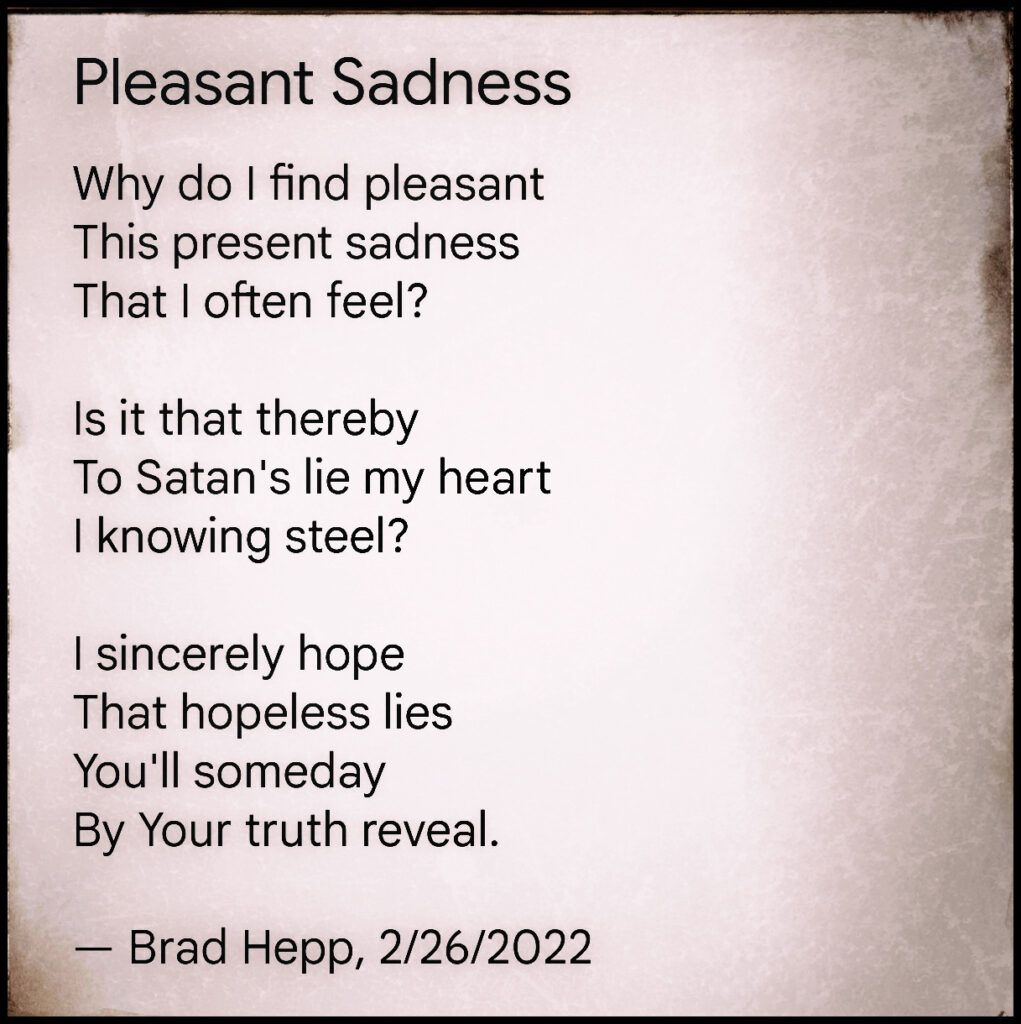
Commentary
I think most people have at one time or another experienced pain that feels strangely pleasant. For instance, when you find a way — perhaps with a friend’s help — to apply pressure to that knot in your back. For some, there is pleasure in the pain of a red-hot pepper. Well, recently, I have noticed that I am strangely drawn to sadness, and feel a certain pleasure in its presence.
In one of my recent poems, I depicted sadness as a lady who has me sabbath in her house. She feeds me and urges me to “rest and weep.” In the commentary for that poem, I suggested that the process I am in is one of becoming more compassionate. I’m pretty sure that’s fundamentally true.
But in the poem above, I ask if the reason for this phase (I guess it’s a phase) is that I need to fully recognize and steel myself against Satan’s lies. The emotion of sadness helps me better comprehend what I’m looking at in a fallen world. Things are not the way they’re supposed to be, no matter what anyone might say.
When I contemplate oppression, poverty, and death, it’s hard to imagine a future world where these are eradicated. It seems that everywhere I look in this current world, wealth is amassed at someone else’s expense. In a generally prosperous culture, that’s not always easy to see, but I’m learning to connect the dots.
How could it work any other way? I believe it will some day, but how? That’s what the last stanza of my poem addresses. When the all-powerful Creator has restored the world to its original design, then my questions will be answered.
February 26, 2023 Additional Comments:
[This part I barely understand, so bear with me. If it’s too dense, skip to the last paragraph]
In “The Crucifixion,” Fleming Rutledge writes about a “PARADOX: THE KNOWLEDGE OF SIN AS JOYFUL GOOD NEWS.” It’s a startling claim, but Rutledge makes a good case for it. Later in that chapter, she writes the following: “The action of God’s grace precedes our consciousness of sin, so that we perceive the depth of our own participation in sin’s bondage, simultaneously with the recognition of the unconditional love of Christ, which is perfect freedom. We recognize that love, moreover, not from the depths of the hell we were bent on creating for ourselves, but from the perspective of the heaven that God is preparing for us.”
Over the last few years, I have increasingly felt this strange pleasure at recognizing what a wretch I am, not only on the basis of my own sinfulness, but also on the basis of my being PART of a sinful humanity. This strange sensation is something I tried to explain with the attached poem, which I wrote exactly one year ago. The reason that I offered then was surely right in part. But it didn’t fully account for the pleasant sadness.
So, Rutledge—and other wise souls—are helping me understand the pleasant sadness.
[This part may be easier to understand, as it relies on imagination more than on theology.]
I picture myself on a long hike with Jesus. Naturally, the trail we’re on is along the sides of some mountain in the Rockies. We can see forever. Conversation turns to why Jesus had to die for me. It was my sin. He goes into detail. But we keep walking. He’s with me on the trail because he loves me. It’s obvious. He’s telling me these things because he loves me. Otherwise, we wouldn’t be here. He wants me to know that he knows fully well what kind of rotten friend I am. Amazingly, it doesn’t feel like scolding. Through talking with me about my sin, Jesus produces in me a pleasant sadness. He reassures me I need not fear his rejection some day when the truth comes out. He took care of everything. Everything.
“Change” Poems:
Previous: The Rusty Pail
Next: In Time Out of Mind
